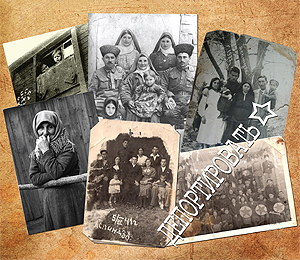Consideration of claims for the assignment of status of the repatriate to Meskhetian Moslems, deported in 1944, is still in process in Georgia. At present, out of 9 thousand requests, the status of the repatriate was granted to 105 Meskhetians by the Ministry of Refugees of Georgia.
A special operation on deportation of the local Muslim population in Meskheti region of South Georgia was set at night, November 15th, 1944. Soviet authorities brought units of the National Ministry of Interior Affairs to the region. From 125 to 144 thousand people – children, women, old men – were taken from 220 villages and wagons transported to various republics of Central Asia in army trucks and cattle. Few thousand people perished from hunger and illnesses during the journey…
In 63 years, on July 11th, 2007, the law on repatriation of people forcefully deported from Georgian Soviet Socialistic Republic in the forties of XX-th century was passed at last. According to this law, any person deported from Georgia against his or her will, had the right for repatriation. Along with Meskhetians this right was given to Kurds-Moslems, Hamshils (Armenians-Moslems) and Karapapakhis, who had resided in Georgia until 1944.
The question on Meskhetian repatriation has been lifted during presentation of book “Meskhetians: a way home…” in Tbilisi. Publication of this book was arranged by ECMI with the assistance of the European Union in the frameworks of the program «Support repatriation of deported from Georgia and their descendants in 1940». The book was issued in Georgian, English and Russian languages simultaneously. The book contained general data on why Meskhetian Moslems were deported from their native land and on their continuing struggle to return home.
One of the book authors, head of regional ECMI office, Tom Trier has declared that the primary goal of this book is to cause discussion in society concerning the process of Meskhetians returning back to Georgia. ”Information given in the book can become a basis for a full analysis, on the grounds that many don\’t have information on the situation at all,” says Tom Trier.
However, Meskhetians residing in Georgia still assume that the state pays insufficient attention to this theme. “First of all, we insist on practical execution of “Law on repatriation”, accepted by parliament in 2007”, – says the chairman of International Meskhetian Congress, Sandro Khozrevanidze.
To receive the status of a repatriate person, it is necessary to collect data that a person himself or his/her ancestors were forcefully moved from Georgia, along with certificates about his family composition, physical health and the absence of previous conviction. All these documents in Georgian or English are to be submitted to embassies or consulates of Georgia on the territory of a residing country.
The representative of the International Union of Deported “Meskheti”, Iso Molidze, considers that the abovementioned law apparently states impracticable conditions. As one of them he specifies the requirement to present the certificate of the origin. Molidze reminds that most of the Meskhetians were expelled from Uzbekistan in July, 1989, as a result of a market quarrel in Fergana valley. “Now they are told: go to Fergana valley and receive the document. It’s the same as demanding a house management certificate from Abkhazian refugee. Maybe he will reach the house management alive, but, things being as they are now, no one is going to bother about the document”, says Molidze bitterly. In his opinion, an identification of applicants is the state’s job, given that copies of birth certificates and other documents still remain in local archives. Due to the fact that there were no conflicts between Uzbekistan and Georgia, the demand for the required documents could be met quickly.
However, a basic discontent of representatives of the Meskhetian organizations is caused by the narrow time-frame of the law. According to the first edition, accepted in 2007, it was possible to apply only from the beginning of 2008 till January 1st 2009. Following amendments prolonged the period of application until January 1st, 2010.
After that, an applicant could only submit the corrected document until January 1st, 2011, if such a necessity was announced by Georgian government through its foreign offices. In two years 8900 application were filed. Only these documents will be considered by the ministry of refugees and internally displaced people of Georgia. No application for granting the status of the repatriate, submitted after January, 1st, 2010 will be accepted in consideration. Thus, the law on granting the status of the repatriate actually became the statutory act of disposable use. Once submitted applications will be examined, the law will cease to act. According to Sandro Khozrevanidze, the narrow time frames are not the only weak point of law: “First of all, Meskhetians demand for return of their Georgian citizenship. In addition, we ask for return of ancestral names, and only in the third place we’re talking about restoration of our right for property, lost in 1944”.
It should be noted that the law on repatriation does not give the right for returning the property on the territory of Georgia. Nor does it ease up the taxation or provide any social benefits. The only thing that the immigrant gets is Georgian citizenship. However, many experts believe it is quite a doubtful gift: by getting Georgian passport, immigrant loses citizenship, which he had owned before he decided to move to Georgia. Even today, the loss of citizenship is connected to many inconveniences. For example, deprived of citizenship of one of the CIS countries – Azerbaijan, Kazakhstan, Russia or Uzbekistan, immigrant loses the right to cross borders with Russia visa-free. In short, the immigrant who decided to move to Georgia, loses all the benefits he had before applying for repatriation. After obtaining the status of the immigrant, a person must renounce citizenship of the country where he lived before, and with the loss of citizenship, loses all the rights he had in a country of former residing, such as the right to receive a pension (and in Azerbaijan or Russia, for example, pension is two or more times higher than in Georgia), as well as the right to travel to Russia visa-free. This last fact, according to the settlers, already gives a lot of inconveniences.
“Many of us have relatives living in Russia, because most of those who left the Fergana Valley in Uzbekistan after the market quarrel in 1989, such as me, for example, have settled there. I was forced to appeal to the Swiss consulate to travel to Krasnodar for the funeral of a relative. To do so, I had to ask people in Krasnodar region to send a telegram explaining the reason why it was necessary for me to go. But one should be able to visit ones relatives not only because of their death!”- says immigrant Ali Eyubov.
It seems that in such situation it would be much easier for Mesketians to forget about repatriation and just use a residence permit in Georgia. In fact, the owner of the residence permit has the same rights as the citizens of Georgia, except the right for social help, as well as the right to elect and be elected. But if a person really wants to become an active citizen, then, after five years of living in Georgia with a residence permit, he is automatically entitled the citizenship of Georgia, however, with the condition of loss of previous nationality.
However, according to Sandro Khozrevanidze, those Meskhetians who genuinely yearn to return to Georgia have strong ethical barriers against obtaining a residence permit: “We want justice! It is very important for us that our right for Georgian nationality must be recognized. It’s a primary condition.”
Khozrevanidze expresses extreme dissatisfaction with the fact that almost two years have passed since the end of filing the cases and the Ministry of Refugees has finished examining just 105 of them. This is the exact number of people given the status of immigrants.
“The law on repatriation has no specified time limits for processing the applications. However, it is unclear why considering the cases of those people proceeds so slowly. We insist that the Ministry for Refugees must at last introduce some time frames for those cases. Otherwise, theoretically, they may examine applications for eternity”, – says Khozrevanidze.
In his turn, an employee of the Ministry of Refugees, Levan Gzobava says it was always planned to complete the review of all cases within three years, but the ministry will not accept any new applications.
Theoretically, those who wish to move to Georgia, but did not apply, may do so without resorting to the law on repatriation. There are no legal obstacles to this. However, as “Open Society – Georgia” fund’s employee Malkhaz Saldadze says: “some rejection of the Meskhetians exists among few radical politicians. Of course, it is not open, and gradual integration of the settlers eventually takes place, but the initial reaction of the population is often connected with rejection.”
Immigrants who settled at their own risk in Georgia since 1981, most often do not have any problems with local population, although sometimes there are cases of some tension among different ethnic groups.
“And this will occur until we won’t be assimilated and won’t return to our primordial cultural source — Georgian society», – tells Sandro Khozrevanidze.
A well-known Georgian activist for human rights, Emil Adelkhanov believes that many won’t return for the fear of conflict with the local population. “The negative attitude towards deported is a consequence of active propaganda by nationalist forces in the early 90s. Invocation and explanatory work of the non-governmental organizations are needed in regions of Georgia”, he says.
It should be noted that fears of radical Georgian politicians concerning “mass” repatriation are, at least, groundless. And one of the key indicators is the number of applications, some part of which will be obviously “rejected.”
Krasnodar Region is recognized by experts as one of the most disadvantaged regions for Meskhetians to reside at. Difficult living conditions were created by local authorities and Cossacks there. According to the survey, Meskhetians were named as the “enemy number one” of the region a few years ago.
In 2006, about 12 000 Meskhetians were resettled from the Krasnodar Region to the United States. According to various sources, about one-two thousand of Meskhetians still remain in the region.
“The rest do not want to lose Russian passports, because obtaining them was too hard. Moreover, relocation to Georgia doesn’t warrant them any better conditions than what they have today. Only old people dream of repatriation, as in their emotional memory they see Georgia as their homeland”, says former executive director of Novorossiysk Human Rights Committee, Tamara Karasteleva. It is worth noting that Meskhetian resettlement to the United States program was implemented due to the efforts of the NHRC.
According to Karasteleva, Meskhetians resettled to the United States are already fully adapted to new conditions of life and most of them do not want to give up American passports. It should be added that out of 8900 applications for the repatriation just two applications were received from young Meskhetians residing at United States.
Vakhtang Balavadze, for newcaucasus.com













